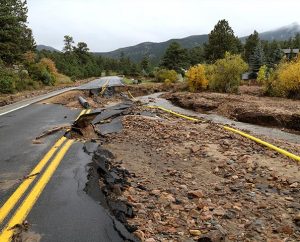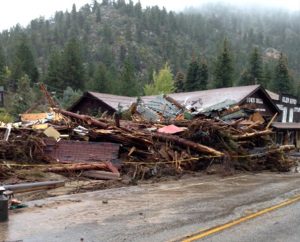By Paula Schlueter Ross
Seeing firsthand how “devastating” the flood damage in Colorado still was on Sept. 27, two weeks after residents were being airlifted from their mountain homes — “how creeks and rivers and streams have changed course, to see roads that were there [now] washed away, or the town hall just about ready to fall over” — was a shock to the Rev. Michael Meyer, manager of LCMS Disaster Response.

Touring areas with extensive damage in Estes Park and Longmont, Colo., was particularly unsettling to Meyer because he’s the former pastor of an LCMS congregation in Denver, “and so a lot of the roads that we were traveling on, I’ve seen before,” Meyer told Reporter. Seeing that same scenery, post-flood, “was really a sad experience,” he said. “But knowing that we are able to make a difference” in people’s lives gave Meyer a more positive outlook, he added.
Accompanying Meyer in Colorado were the Rev. Glenn Merritt and the Rev. Ross Johnson, who are serving concurrently as directors of LCMS Disaster Response. Merritt, who has held the post since 2006, plans to retire next summer; Johnson, Merritt’s successor, began serving in the post Sept. 3.
Also along on the one-day trek were two Rocky Mountain District staff members: Doug Ullmann, executive for administration, and Chuck Pierce, the district’s disaster-response coordinator.
Ullmann and Pierce continue to work with congregations, evaluating needs and mobilizing volunteer and financial resources.
“Our congregations in these affected areas are doing an excellent job of meeting the material, emotional and spiritual needs of their members, but an even larger group of non-LCMS people are affected,” Ullmann told Reporter. “Those local congregations will have a great opportunity to reach those communities with mercy where an LCMS congregation presence is absent.”
The Rocky Mountain District has so far disbursed $7,600 from its own disaster fund in grants to congregations. Those funds have been used for gift cards, replacement of lost income, general supplies and daily necessities.
“With the amount of damage sustained, recovery will be a long process,” Ullmann said. “This will be a marathon and not a sprint.”
Although many of those with flood damage have begun cleanup, others have not, and some still haven’t been able to get back to their homes because of impassable roads.

The floodwaters “destroyed roads leading to people’s houses or destroyed the houses themselves,” noted Johnson. “Either way, you have displaced people who need temporary housing — whether it’s going to be a few months or up to six or seven months.”
That need for transitional housing — apartments where residents can live while their homes are being repaired — is now becoming “an urgent issue, especially as winter weather is just around the corner,” said Merritt.
LCMS Disaster Response has pledged financial assistance to the Rocky Mountain District to help with cleanup and housing needs. At least four local LCMS congregations are in the process of applying for disaster grants. “Funding of the grants will likely be a joint endeavor by LCMS Disaster Response and the Rocky Mountain District,” Merritt said. It is likely that more Synod congregations in the area will request grants to help those in their communities.
Johnson noted that “the vast majority” of those with flood damage don’t have flood insurance, since their homes are not in a typical flood plain. “So everything that has to be done is essentially going to be done out of pocket,” he said. “So whether it’s mucking out their house, gutting out the drywall, replacing the drywall, replacing clothes, replacing vehicles that were damaged in the flood — all of that is left to the homeowners, the individuals. That’s why this is so devastating.”
According to the Rocky Mountain District, the flood affected 17 Colorado counties, destroying some 1,882 homes and damaging more than 16,000, with total damages to all properties estimated at more than $2 billion.
To support those in need:
- Make an online gift at https://www.lcms.org/givenow/disaster.
- Mail checks payable to “The Lutheran Church—Missouri Synod” (with a memo line or note designating “LCMS Disaster Relief”) to The Lutheran Church—Missouri Synod, P.O. Box 66861, St. Louis, MO 63166-6861.
- Call toll-free 888-930-4438 (8:10 a.m. to 4:10 p.m. Central Time, Monday through Friday).
For more information about the Synod’s response to disasters, visit lcms.org/disaster.
Updated Oct. 18, 2013




